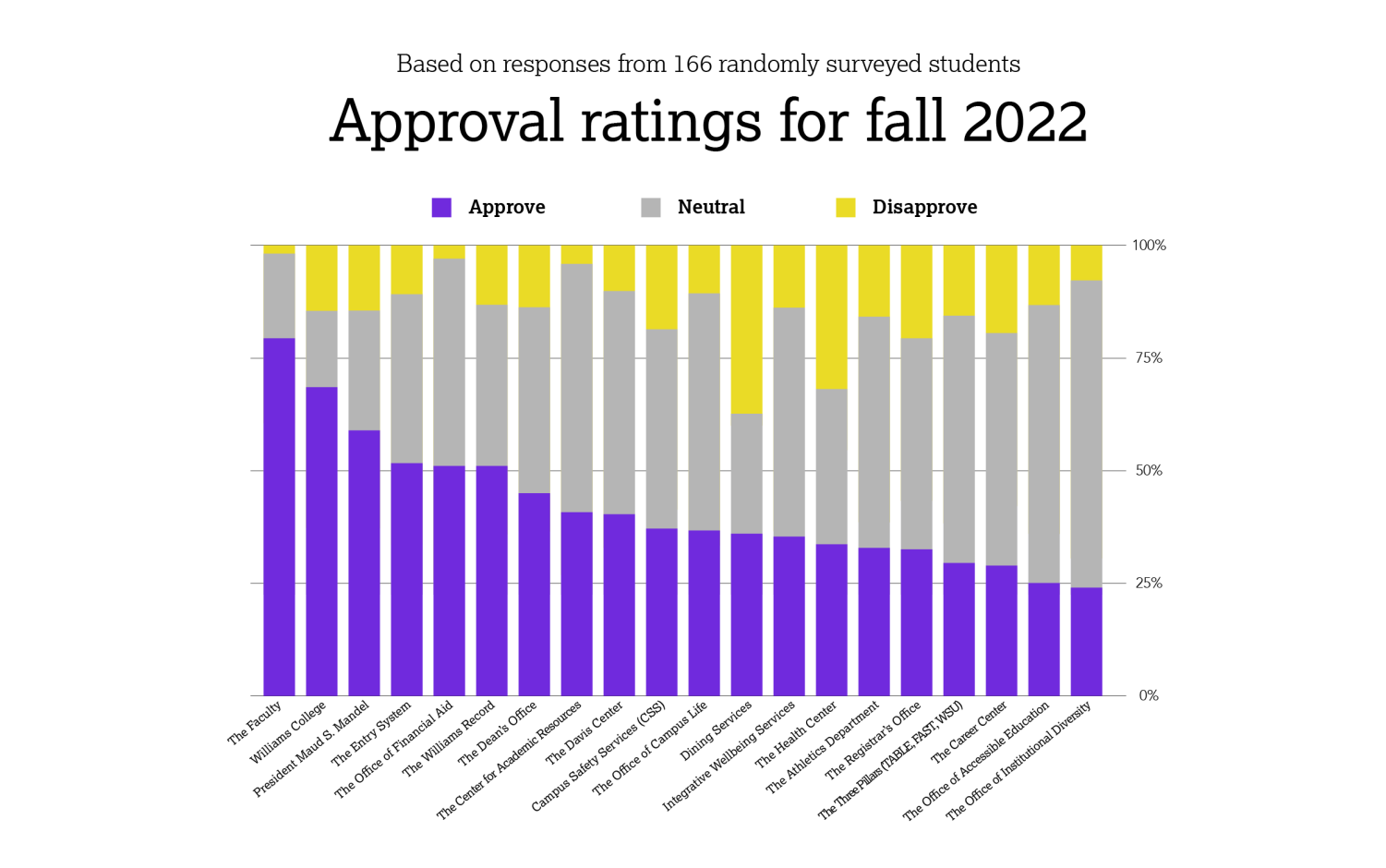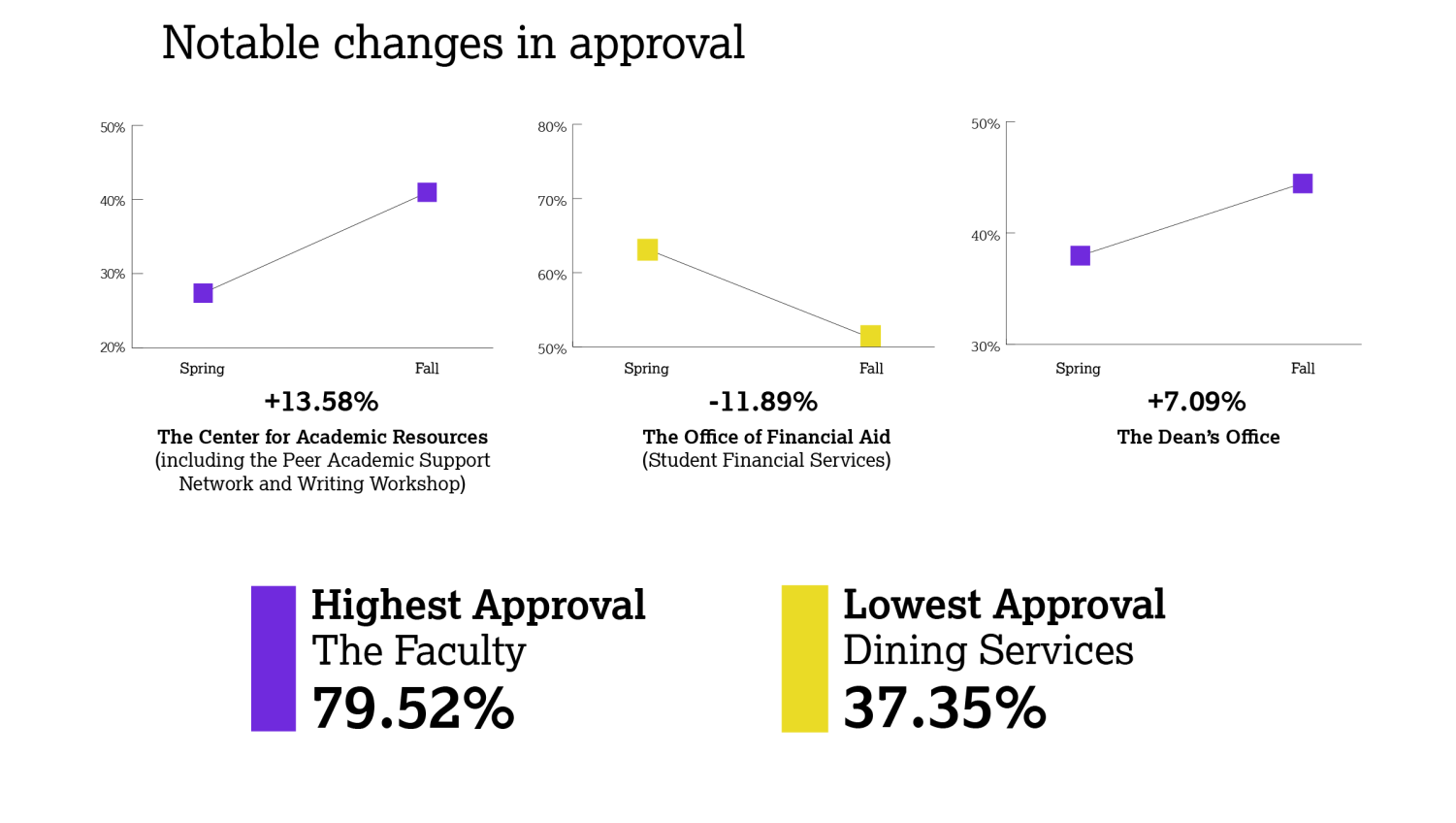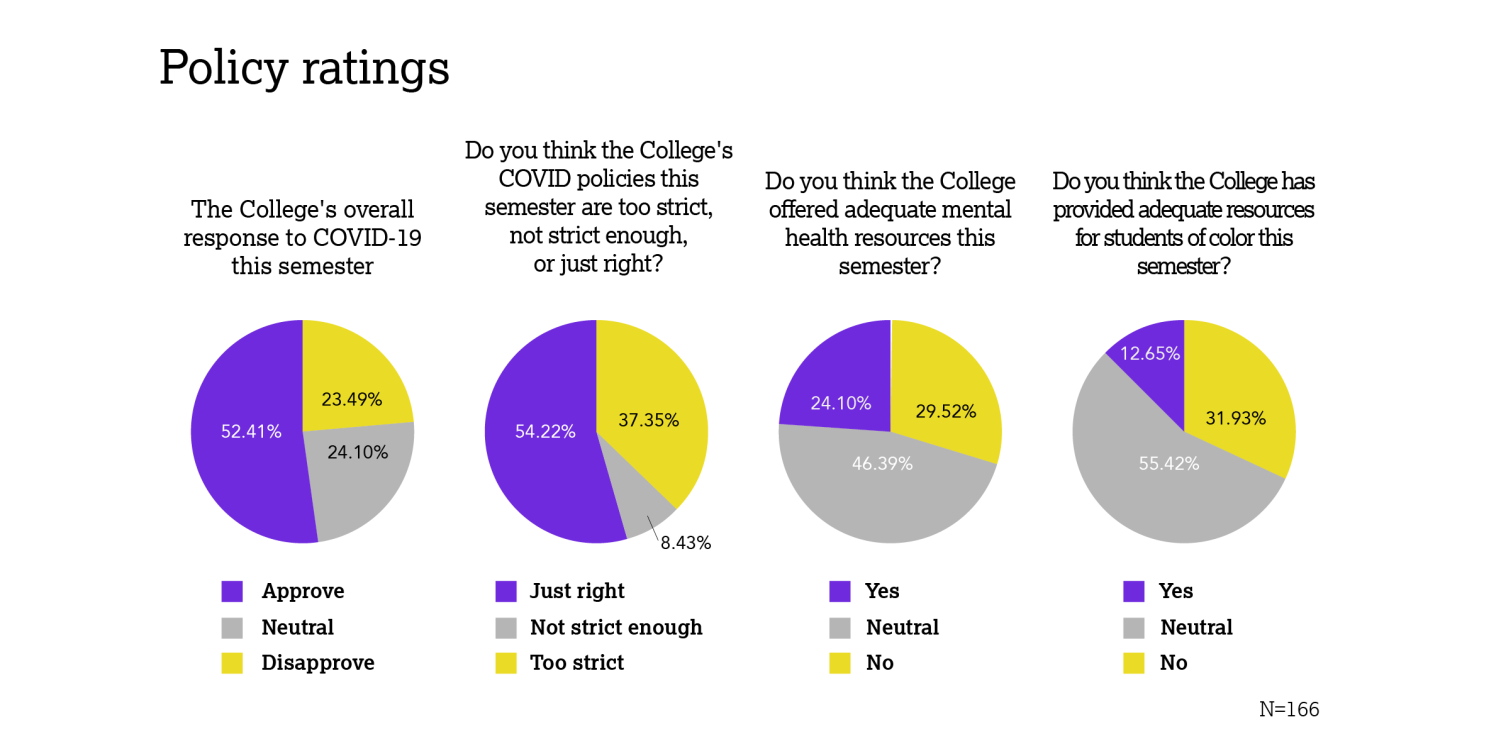Record approval ratings survey shows increased approval of IWS, COVID policies
December 7, 2022

The Record sent its biannual survey to 500 randomly selected unixes last week to gauge students’ approval of College policies and institutions. The survey found that approval of many College institutions decreased, while a few, including Integrative Wellbeing Services (IWS), saw increases in approval. Approval of the College’s policies, including COVID-19 restrictions and support for students of color, varied across gender and race.
This semester’s survey garnered a response rate of 33 percent, similar to past approval ratings surveys, and has a margin of error of 7.6 percent. Thirty percent of the survey’s 166 respondents were seniors, while juniors, sophomores, and first-years made up 23 percent, 19 percent, and 29 percent of respondents, respectively. Off-cycle respondents were asked to round up their class years.
Approximately half of the survey’s respondents said they received financial aid, consistent with the proportion of the student body that receives aid. Fifty-two percent of respondents use he/him/his pronouns, 45 percent of respondents use she/her/hers pronouns, and 5 percent of respondents use they/them/theirs or other pronouns.
Approximately 70 percent of respondents identified themselves as white, 23 percent as Asian or Asian American, and 8 percent as African American or Black. Twelve percent of respondents identified as being of Hispanic or Latina/o/x origin, in keeping with the student body average. While the Record and the College used slightly different metrics for measuring demographic data, responses from students who identified as white and responses from students who use he/him/his pronouns were likely overrepresented in the results of this survey.
The survey asked respondents to rank their approval, disapproval, and neutrality toward various College institutions.

The Office of Financial Aid saw the largest decrease in approval compared to last spring, dropping 12 points to 51 percent. Last spring, the Office of Financial Aid’s approval ratings increased nearly 30 percent over the previous semester on the heels of the College’s implementation of an all-grant financial aid policy. This semester’s decrease leaves the office with an approval rating 15 percent higher than that of last fall, prior to the policy change.
Integrative Wellbeing Services (IWS) saw an increase of 7 points in approval this semester, rising to 36 percent. This fall, IWS has seen record student demand for its services, but it has hired five contract therapists, expanded access to self-scheduled appointments and telehealth offerings, and hired two staff psychiatrists to help meet demand.
The Center for Academic Resources experienced the largest increase in approval — 14 percent — and now holds a 41-percent approval rating. However, this survey’s description of the Center differed from that of previous surveys, adding a note that the Center includes the Peer Academic Support Network and Writing Workshop.
Once again, the faculty had the highest approval rating, at 80 percent — a 5-percent decrease from last spring — while Dining Services had the highest disapproval rating, at 37 percent — a 2-percent increase.
In addition to approval of College institutions, the survey also asked respondents about their approval of the College’s mental health resources, COVID-19 policies, and support for students of color.

Thirty percent of respondents said the College did not offer adequate mental health resources this semester, a 14-percent decrease from last semester.
Fifty-two percent of respondents said they approved of the College’s overall response to COVID-19 this semester, while 23 percent disapproved. In comparison, only 38 percent of respondents to last spring’s survey approved of the College’s response to COVID that semester, while 31 percent disapproved. To 37 percent of this fall’s respondents, the College’s COVID policies this semester have been too strict, while 54 percent said they were just right and 8 percent said they were not strict enough. Last spring, 46 percent said they felt the policies were too strict, 44 percent said they were just right, and the remaining 10 percent said they were not strict enough.
Approval of COVID policies varied by students’ pronouns: Thirty-four percent of respondents who use he/him/his pronouns disapproved of the College’s response to COVID this semester, and 48 percent of respondents using he/him/his pronouns said that this semester’s policies have been too strict. Of respondents who use she/her/hers pronouns, only 9 percent disapproved, and only 24 percent said that current policies are too strict.
Only 13 percent of respondents said the College provided adequate resources for students of color this semester, while 32 percent said it did not. Forty-three percent of respondents who use she/her/hers pronouns said that support for students of color has been inadequate, while 20 percent of respondents who use he/him/his pronouns said the same. Seventy-one percent of African American- or Black-identifying respondents and fifty percent of respondents of Hispanic or Latina/o/x origin said the College has not provided adequate resources for students of color this semester, while only 25 percent of white-identifying respondents and 29 percent of Asian- or Asian-American-identifying respondents said those resources were inadequate.
This semester, there have been at least three anti-Black bias incidents, and after each, students expressed concerns with the College’s response to the Record.
The following items were also surveyed:
- Williams College: 69 percent approve, 14 percent disapprove, 17 percent neutral
- President Maud S. Mandel: 59 percent approve, 14 percent disapprove, 27 percent neutral
- The entry system: 52 percent approve, 11 percent disapprove, 37 percent neutral
- The Williams Record: 51 percent approve, 13 percent disapprove, 36 percent neutral
- The dean’s office: 45 percent approve, 14 percent disapprove, 41 percent neutral
- The Davis Center: 40 percent approve, 10 percent disapprove, 49 percent neutral
- Campus Safety Services (CSS): 37 percent approve, 19 percent disapprove, 44 percent neutral
- The Office of Campus Life: 37 percent approve, 11 percent disapprove, 52 percent neutral
- The Health Center: 34 percent approve, 32 percent disapprove, 34 percent neutral
- The Athletics Department: 33 percent approve, 15 percent disapprove, 51 percent neutral
- The Registrar’s Office: 33 percent approve, 20 percent disapprove, 47 percent neutral
- The Three Pillars (TABLE, FAST, and WSU): 30 percent approve, 16 percent disapprove, 55 percent neutral
- The Career Center: 29 percent approve, 19 percent disapprove, 52 percent neutral
- The Office of Accessible Education: 25 percent approve, 13 percent disapprove, 61 percent neutral
- The Office of Institutional Diversity, Equity, and Inclusion (OIDEI): 24 percent approve, 7 percent disapprove, 68 percent neutral
Not all percentages may add up to 100 due to rounding.








